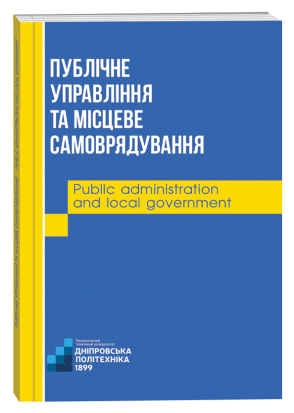PROBLEMATIC ASPECTS OF ENSURING INFORMATION OPENNESS IN THE CONDITIONS OF DIGITAL TRANSFORMATION OF PUBLIC ADMINISTRATION
DOI:
https://doi.org/10.32782/2414-4436/2024-3-1Keywords:
information openness, digital transformation, public administration, information, sustainable developmentAbstract
The article analyzes the problematic aspects of ensuring information openness in the context of the digital transformation of public administration. The digitalization of public services and the management system creates new opportunities for increasing the transparency, accessibility and efficiency of public authorities, but at the same time reveals a number of problems related to information protection, management of large amounts of data and compliance with the right to confidentiality. The main problems that arise when introducing digital technologies into the sphere of public administration are highlighted, and how these technologies affect the interaction between public authorities and citizens is considered. Special attention is paid to the analysis of regulatory and legal regulation in the sphere of information openness, in particular, the issues of protecting personal data and ensuring confidentiality in the context of open access to information. The issue of ethical use of citizens' data that become available thanks to digital platforms is considered. The article focuses on the need to improve the existing regulatory and legal framework in order to ensure adequate protection of citizens' rights and at the same time guarantee the availability of information about the activities of public authorities. Practical approaches to improving information openness mechanisms are proposed, in particular through the implementation of information security standards, the development of new digital platforms, and increasing the level of digital literacy of civil servants and local government officials. It is proven that ensuring information openness should be based on a balance between the availability of information and the protection of citizens' rights to privacy, which is an important element of the successful digital transformation of public administration.
References
Бондарчук Н. В. Взаємодія органів публічної влади та громадянського суспільства в умовах цифровізації. Публічне управління і адміністрування в Україні. Вип. 28, 2022. С. 36–39. URL: https://pag-journal.iei.od.ua/archives/2022/28-2022/7.pdf (дата звернення: 24.11.2024).
Бородін Є., Піскоха Н., Демошенко Г. Проблеми і переваги цифровізації місцевого самоврядування. Аспекти публічного управління. № 9(4), 2021. С. 95–103. URL: https://aspects.org.ua/index.php/journal/article/view/892 (дата звернення: 24.11.2024).
Горбата Л. П. Удосконалення механізму інформаційної відкритості діяльності органів публічної влади в Україні. Науковий вісник: державне управління. № 3, 2020. С. 60–69. URL: http://nbuv.gov.ua/UJRN/nauvisdu_2020_3_7 (дата звернення: 24.11.2024).
Квітка С., Новіченко Н., Бардах О. Штучний інтелект у муніципальному управлінні: вектори розвитку. Аспекти публічного управління, № 9(4), 2021. С. 85–94. URL: https://aspects.org.ua/index.php/journal/article/view/891 (дата звернення: 24.11.2024).
Квітка С., Новіченко Н., Гусаревич Н., Піскоха Н., Бардах О., Демошенко Г. Перспективні напрямки цифрової трансформації публічного управління. Аспекти публічного управління. № 8(4), 2020. С. 129–146. URL: https://aspects.org.ua/index.php/journal/article/view/807 (дата звернення: 24.11.2024).
Квітка С. Цифрові трансформації як сучасний тренд періодичного циклу розвитку суспільства. Збірник наукових праць Національної академії державного управління при Президентові України. Спецвипуск. 2020. С. 131–134. URL: https://ir.nmu.org.ua/jspui/bitstream/123456789/163201/1/%D0%BA%D0%B2%D1%96%D1%82%D0%BA%D0%B0%2017.pdf (дата звернення: 24.11.2024).
Карпенко О. В. Цифрове врядування. Монографія / О. В. Карпенко, Ж. З. Денисюк, В. В. Наместнік / за. ред. О. В. Карпенка. Київ: ІДЕЯ ПРИНТ, 2020.
Карпенко О.В., Карпенко Ю.В. Штучний інтелект як інструмент публічного управління соціальноеко-номічним розвитком: смарт-інфраструктура, цифрові системи бізнес-аналітики та трансферти. Державне управління: удосконалення та розвиток. № 10, 2021. URL: http://www.dy.nayka.com.ua/?op=1&z=2257(дата звернення: 24.11.2024).
Кравченко В. В. Проблеми законодавчого закріплення компетенції місцевого самоврядування в контексті реформи місцевого самоврядування в Україні. Аспекти публічного управління. № 2(11–12), 2014. С. 13–21. URL: https://aspects.org.ua/index.php/journal/article/view/122 (дата звернення: 24.11.2024).
Логвінов В. Г. Цифрові платформи як складова моделі публічного управління. Інституціоналізація публічного управління в Україні в умовах євроінтеграційних та глобалізаційних викликів: матеріали Всеукр. наук.-практ. конф. за міжнар. участю (Київ, 24 трав. 2019 р.) : у 5 т. Київ, 2019. Т. 4. C. 57–59.
Про схвалення Концепції розвитку цифрової економіки та суспільства України на 2018-2020 роки та затвердження плану заходів щодо її реалізації: Розпорядження Кабінету Міністрів України від 17 січня 2018 № 67-р. URL: https://zakon.rada.gov.ua/laws/show/67-2018-р#Text URL: (дата звернення: 24.11.2024).
Семчик О., Приходько Х., Сидоренко П., Петрухін Ф. Стимулювання е-розвитку громад в Україні: концептуально-правові засади (до питання про муніципальне управління на основі даних). Аспекти публічного управління. № 7(9-10), 2019. С. 53–61. URL: https://aspects.org.ua/index.php/journal/article/view/682 (дата звернення: 24.11.2024).
Територіальні громади: механізми забезпечення стійкості : монографія / Грищенко І.М., Горбата Л.П. Київ, НУБіП України, 2024, 345 с. ISBN 978-617-8368-16-6 URL: https://dglib.nubip.edu.ua/items/22dfbd9c-3afc-43d1-866c-b13b8cfb1626 (дата звернення: 24.11.2024).
Desouza K. C. Delivering Artificial Intelligence in Government: Challenges and Opportunities. IBM Center for The Business of Government. 2018. URL: https://www.scirp.org/reference/referencespapers?referenceid=3337621 (дата звернення: 24.11.2024).
Gryshchenko I., Lazor O., Oliinyk V., Lazor O., Yunyk I. Strategic public policy providers in the context of european integration. Amazonia Investiga, № 12(64), 2023. Рр. 175-187. URL: https://amazoniainvestiga.info/check/64/17-175-187.pdf (дата звернення: 24.11.2024).
Mikhaylov S., Esteve M., Campion A. Artificial intelligence for the public sector: opportunities and challenges of cross-sector collaboration. Philosophical Transactions. 2018. URL: https://royalsocietypublishing.org/doi/10.1098/rsta.2017.0357 (дата звернення: 24.11.2024).
Wang W., Siau K. Artifcial Intelligence: A Study on Governance, Policies, and Regulations. MWAIS. 2018. URL: https://aisel.aisnet.org/mwais2018/40 (дата звернення: 24.11.2024).
Walsh T. The AI Revolution, Education: Future Frontiers. Occasional Paper Series. 2017. URL: https://education.nsw.gov.au/media/exar/The_AI_Revolution_TobyWalsh.pdf (дата звернення: 24.11.2024).
West D., Allen J. How artificial intelligence is transforming the world. BROOKINGS. 2018. URL: https://www.brookings.edu/research/how-artificial-intelligence-is-transforming-the-world (дата звернення: 24.11.2024).






